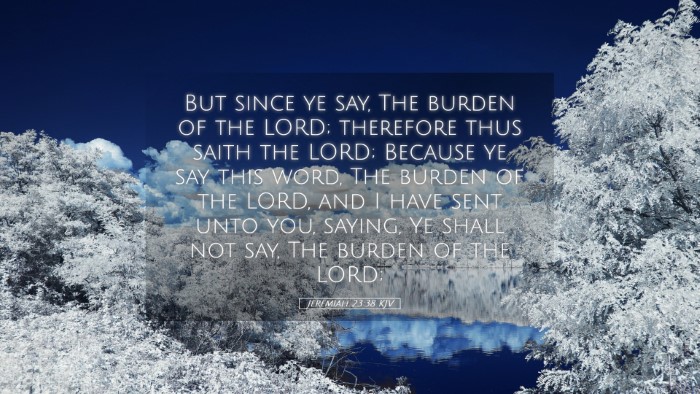Commentary on Jeremiah 23:38
Verse: "But if you say, ‘The burden of the LORD,’ therefore thus says the Lord: ‘Because you say this word, ‘The burden of the LORD,’ and I have sent to you, saying, ‘You shall not say, ‘The burden of the LORD,’” - Jeremiah 23:38
Introduction
This verse forms a pivotal part of Jeremiah's prophecies against the false prophets of his time. It underscores the theme of false proclamations and the consequences of misrepresenting God's word. In scrutinizing this text, we gain insights from prominent commentaries that address the gravity of proclaiming God's messages inaccurately.
Contextual Analysis
Jeremiah's ministry occurred during a tumultuous period in Israel’s history, characterized by rampant idolatry and spiritual corruption. The false prophets were prominent figures mislead by greed and ambition, leading the people away from true worship. This context is essential to understanding the weight of the phrase "the burden of the Lord."
Matthew Henry's Commentary
Matthew Henry emphasizes the seriousness with which God regards those who claim to speak for Him. He notes that the term "the burden of the Lord" implies a responsibility carried with profound seriousness. In claiming to bear this burden, false prophets assume a mantle that they do not possess, thus bringing judgment upon themselves. Henry poignantly remarks that their misuse of the Lord's words reflects both arrogance and deception.
Albert Barnes' Commentary
Albert Barnes provides a critical interpretation of the phrase "the burden of the Lord." He explains that the false prophets misused this solemn expression as a means to pressure the people into compliance. Barnes argues that God is clear in His communication - He does not allow His name or message to be trivialized for personal gain. The warning against saying “the burden of the Lord” serves to convey that genuine prophecy must align with God's will and moral standing. Failure to do so invites divine retribution.
Adam Clarke's Commentary
Adam Clarke takes a detailed approach in interpreting the implications behind this phrase. He notes that the false prophets claimed divine inspiration and thus presumed authority, leading to a contradiction against God's explicit command. Clarke further elucidates that this behaviorsuggests a lack of reverence for God's holiness. It raises questions about leadership accountability and an authentic understanding of prophetic duties. Clarke warns readers to discern carefully who speaks in God’s name.
Theological Implications
At the heart of Jeremiah 23:38 lies a call to integrity in ministry and preaching. Clergy and lay leaders must heed this admonition to ensure their proclamations are sincere reflections of God's word. Misrepresentation of divine messages carries significant consequences, both for the speaker and the audience.
The Weight of Prophetic Responsibility
The commentators collectively affirm that prophetic utterances should be approached with reverence. Every sermon, every teaching, and every claim of "Thus saith the Lord" must be carefully weighed against Scripture and aligned with the character of God. Inaccuracy and deception tarnish the witness of Christ and mislead God’s people.
Application for Today’s Church
In the current ecclesiastical landscape, where various doctrines and teachings vie for the attention of believers, Jeremiah 23:38 serves as a clarion call for diligence and scrutiny. Pastors and teachers are encouraged to cultivate a robust theological education and maintain integrity as they engage with their congregations. Ensuring that their communication aligns with biblical truth is paramount to sustaining the church’s mission.
Conclusion
Jeremiah 23:38 encapsulates a profound warning against the perils of false prophecy and misrepresentation of God's word. Drawing from the insights of revered commentators such as Matthew Henry, Albert Barnes, and Adam Clarke, we glean vital principles for both the ministry and individual believers. As custodians of God’s message, it is imperative to approach our claims with humility, responsibility, and a deep reverence for God’s truth.


